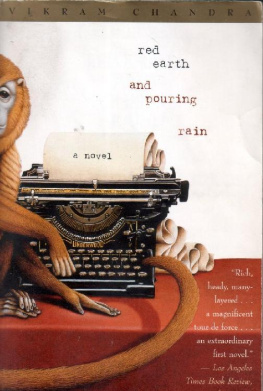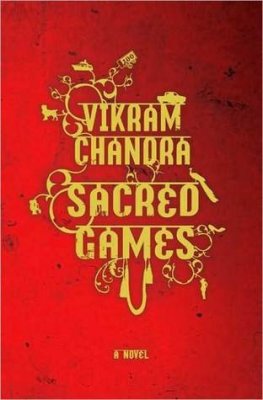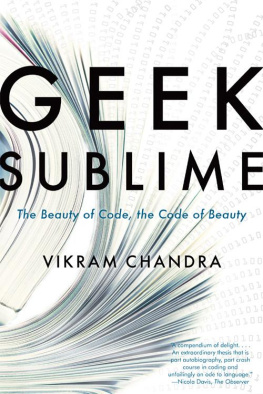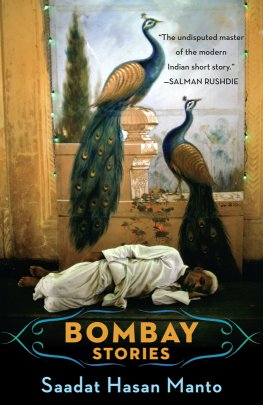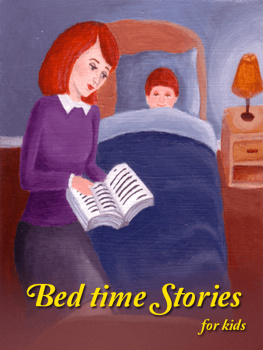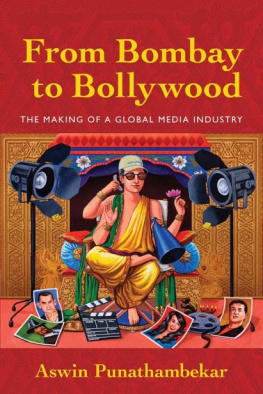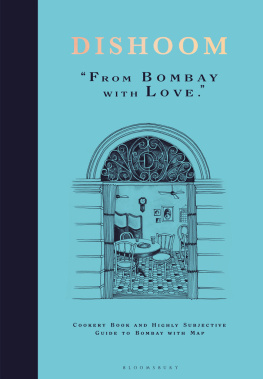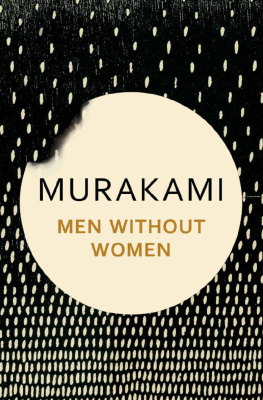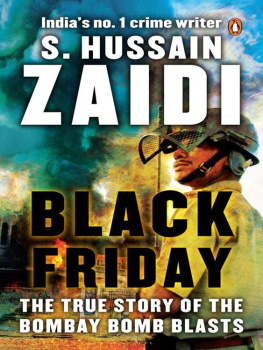Vikram Chandra - Love and Longing in Bombay
Here you can read online Vikram Chandra - Love and Longing in Bombay full text of the book (entire story) in english for free. Download pdf and epub, get meaning, cover and reviews about this ebook. year: 2012, publisher: Faber & Faber, genre: Prose. Description of the work, (preface) as well as reviews are available. Best literature library LitArk.com created for fans of good reading and offers a wide selection of genres:
Romance novel
Science fiction
Adventure
Detective
Science
History
Home and family
Prose
Art
Politics
Computer
Non-fiction
Religion
Business
Children
Humor
Choose a favorite category and find really read worthwhile books. Enjoy immersion in the world of imagination, feel the emotions of the characters or learn something new for yourself, make an fascinating discovery.
- Book:Love and Longing in Bombay
- Author:
- Publisher:Faber & Faber
- Genre:
- Year:2012
- Rating:5 / 5
- Favourites:Add to favourites
- Your mark:
- 100
- 1
- 2
- 3
- 4
- 5
Love and Longing in Bombay: summary, description and annotation
We offer to read an annotation, description, summary or preface (depends on what the author of the book "Love and Longing in Bombay" wrote himself). If you haven't found the necessary information about the book — write in the comments, we will try to find it.
Love and Longing in Bombay — read online for free the complete book (whole text) full work
Below is the text of the book, divided by pages. System saving the place of the last page read, allows you to conveniently read the book "Love and Longing in Bombay" online for free, without having to search again every time where you left off. Put a bookmark, and you can go to the page where you finished reading at any time.
Font size:
Interval:
Bookmark:
Vikram Chandra
Love and Longing in Bombay
For
my first readers:
my sisters,
Tanuja and Anupama;
and
Margo True
Acknowledgments
Im grateful, as always, to my parents, Navin and Kamna. Also, for friendship, information, aid, and inspiration, my thanks to: Eric Simonoff; Linda Asher; David Davidar; Jordan Pavlin; Nicholas Pearson; Lekha Rattanani; Vidhu Vinod Chopra; Vir Chopra; Sheela Rawal; Smruti Koppikar; Arun Subramaniam; Rakesh Maria, Additional Commissioner of Police, Crime Branch, Bombay; Mahesh Bhatt; Farah Khan; Sanjay Leela Bhansali; Vikram Chopra; Kathy and Glenn Cambor; Cece Fowler; Marion Barthelme; Claire Lucas; Christa Forster; Amy Storrow; Leslie Richardson; Susan Davis; David Harvey; Rifka Tadjer; Lu Wiu; A. S. Samra, Director General of Police, Bombay; Deepak Jog, Deputy Commissioner of Police, Bombay; Viral Mazumdar; Lieutenant Colonel H. L. Saluja (Retd.); Colonel N. B. Kanuga (Retd.); Shelina Kukar; Comilla Shahani Denning; Namrita Shahani Jhangiani; Anuradha Tandon; Brig. Harish Chandra; Shanti Chandra; Brig. Sudhir Arora (Retd.); Anne Bogle; Rebecca Flowers; Paulette Roberts; Sanjay (Pinku) Desai; Pam Francis; Amy Georgia Buchholz; Jack Brandt; Leslie Nigham; Wendy James; Ashish Balram Nagpal.
Dharma
CONSIDERING THE LENGTH of Subramaniams service, it was remarkable that he still came to the Fishermans Rest. When I started going there, he had been retired for six years from the Ministry of Defence, after a run of forty-one years that had left him a joint-secretary. I was young, and I had just started working at a software company which had its air-conditioned and very streamlined head offices just off the Fountain, and I must confess the first time I heard him speak it was to chastise me. He had been introduced to me at a table on the balcony, sitting with three other older men, and my friend Ramani, who had taken me there, told me that they had been coming there for as long as they had worked and longer. Subramaniam had white hair, he was thin, and in the falling dusk he looked very small to me, the kind of man who would while away the endless boredom of his life in a bar off Sasoon Dock, and so I shaped him up in my mind, and weighed him and dropped him.
I should have noticed then that the waiters brought his drinks to him without being asked, and that the others talked around his silence but always with their faces turned towards him, but I was holding forth on the miserable state of computers in Bombay. The bar was on the second floor of an old house, looking towards the sea, and you wouldnt have known it was there, there was certainly no sign, and it couldnt be seen from the street. There were old trophy fish, half a century old at least, strung along the walls, and on the door to the bathroom there was a picture of a hill stream cut from a magazine, British by the look of it. When the wind came in from the sea it fluttered old flowered curtains and a 1971 calendar, and I was restless already, but I owed at least a drink to the courtesy of my friend Ramani, who understood my loneliness in Bombay and was maybe trying to mix me in with the right circle. So I watched a navy ship, a frigate maybe, wheel into the sun, sipped my drink (despite everything, I noticed, a perfect gin sling), and listened to them talk.
Ramani had been to Bandra that day, and he was telling them about a bungalow on the seafront. It was one of those old three-storied houses with balconies that ran all the way around, set in the middle of a garden filled with palms and fish ponds. It sat stubbornly in the middle of towering apartment buildings, and it had been empty as far back as anyone could remember, and so of course the story that explained this waste of golden real estate was one of ghosts and screams in the night.
They say its unsellable, said Ramani. They say a Gujarati seth bought it and died within the month. Nobodyll buy it. Bad place.
What nonsense, I said. These are all family property disputes. The cases drag on for years and years in courts, and the houses lie vacant because no one will let anyone else live in them. I spoke at length then, about superstition and ignorance and the state of our benighted nation, in which educated men and women believed in banshees and ghouls. Even in the information age we will never be free, I said. I went on, and I was particularly witty and sharp, I thought. I vanquished every argument with efficiency and dispatch.
After a while my glass was empty and I stopped to look for the bearer. In the pause the waves gathered against the rocks below, and then Subramaniam spoke. He had a small whispery voice, a departmental voice, I thought, it was full of intrigues and secrets and nuances. I knew a man once who met a ghost, he said. I still had my body turned around in the seat, but the rest of them turned to him expectantly. He said, Some people meet their ghosts, and some dont. But were all haunted by them. Now I turned, too, and he was looking straight at me, and his white hair stood clearly against the extravagant red of the sunset behind him, but his eyes were shadowed and hidden. Listen, he said.
*
On the day that Major General Jago Antia turned fifty, his missing leg began to ache. He had been told by the doctors about phantom pain, but the leg had been gone for twenty years without a twinge, and so when he felt a twisting ache two inches under his plastic knee, he stumbled not out of agony but surprise. It was only a little stumble, but the officers who surrounded him turned away out of sympathy, because he was Jago Antia, and he never stumbled. The younger lieutenants flushed with emotion, because they knew for certain that Jago Antia was invincible, and this little lapse, and the way he recovered himself, how he came back to his ramrod straightness, this reminded them of the metallic density of his discipline, which you could see in his grey eyes. He was famous for his stare, for the cold blackness of his anger, for his tactical skill and his ability to read ground, his whole career from the gold medal at Kharakvasla to the combat and medals in Leh and NEFA. He was famous for all this, but the leg was the centre of the legend, and there was something terrible about it, about the story, and so it was never talked about. He drove himself across jungle terrain and shamed men twenty years younger, and it was as if the leg had never been lost. This is why his politeness, his fastidiousness, the delicate way he handled his fork and knife, his slow smile, all these Jago quirks were imitated by even the cadets at the Academy: they wished for his certainty, and believed that his loneliness was the mark of his genius.
So when he left the bara khana his men looked after him with reverence, and curiously the lapse made them believe in his strength all the more. They had done the party to mark an obscure regimental battle day from half a century before, because he would never have allowed a celebration for himself. After he left they lolled on sofas, sipping from their drinks, and told stories about him. His name was Jehangir Antia, but for thirty years, in their stories, he had been Jago Antia. Some of them didnt know his real name.
Meanwhile, Jago Antia lay on his bed under a mosquito net, his arms flat by his sides, his one leg out as if at attention, the other standing by the bed, and waited for his dream to take him. Every night he thought of falling endlessly through the night, slipping through the cold air, and then somewhere it became a dream, and he was asleep, still falling. He had been doing it for as long as he could remember, long before para school and long before the drop at Sylhet, towards the hostile guns and the treacherous ground. It had been with him from long ago, this leap, and he knew where it took him, but this night a pain grew in that part of him that he no longer had, and he tried to fight it away, imagining the rush of air against his neck, the flapping of his clothes, the complete darkness, but it was no use. He was still awake. When he raised his left hand and uncovered the luminous dial it was oh-four-hundred, and then he gave up and strapped his leg on. He went into the study and spread out some maps and began to work on operational orders. The contour maps were covered with markers, and his mind moved easily among the mountains, seeing the units, the routes of supply, the staging areas. They were fighting an insurgency, and he knew of course that he was doing good work, that his concentration was keen, but he knew he would be tired the next day, and this annoyed him. When he found himself kneading his plastic shin with one hand, he was so angry that he went out on the porch and puffed out a hundred quick push-ups, and in the morning his puzzled
Font size:
Interval:
Bookmark:
Similar books «Love and Longing in Bombay»
Look at similar books to Love and Longing in Bombay. We have selected literature similar in name and meaning in the hope of providing readers with more options to find new, interesting, not yet read works.
Discussion, reviews of the book Love and Longing in Bombay and just readers' own opinions. Leave your comments, write what you think about the work, its meaning or the main characters. Specify what exactly you liked and what you didn't like, and why you think so.


